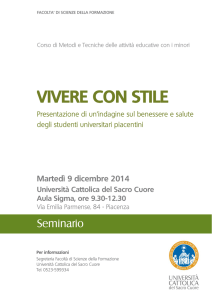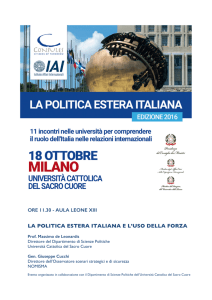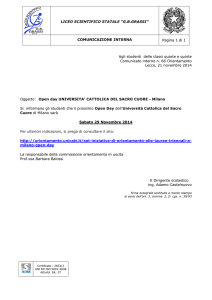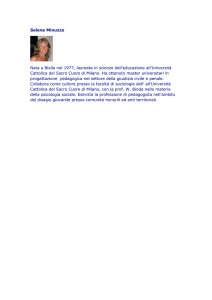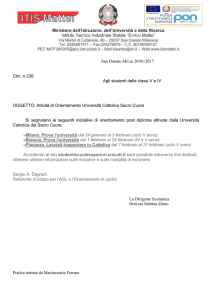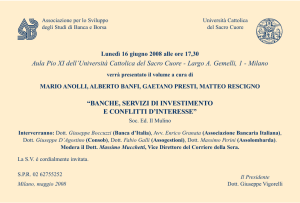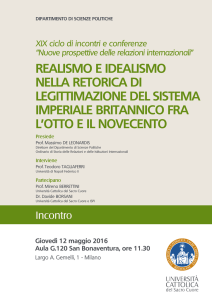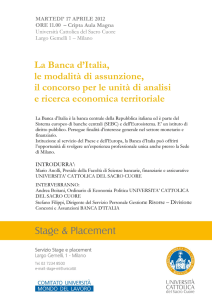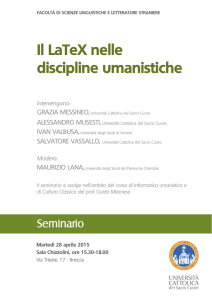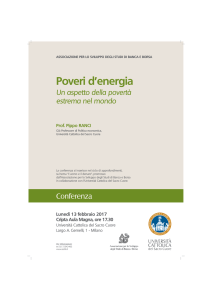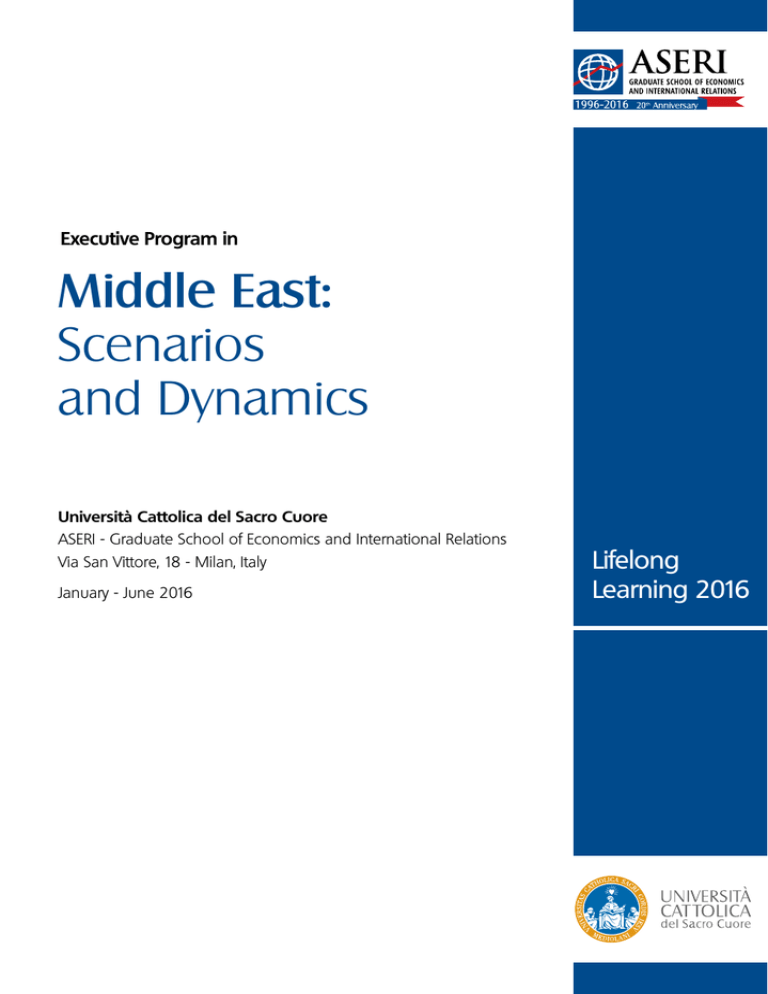
Executive Program in
Middle East:
Scenarios
and Dynamics
Università Cattolica del Sacro Cuore
ASERI - Graduate School of Economics and International Relations
Via San Vittore, 18 - Milan, Italy
January - June 2016
Lifelong
Learning 2016
Why an Executive program on Middle East?
Middle East has become, since decades, a crucial region in the international
system for political, geostrategic and economical reasons. Whether
you are working in private sector, journalism, NGOs, public agencies
or consultancies, you’ll increasingly have the need to acquire specific
competences to face the challenges arising from working with this
fascinating yet complex area.
uA new opportunity for executives and professionals who are
willing to achieve a better understanding of the Middle East, increase
their knowledge of this region, and foster their skills in complex
operations at international level.
The Executive Program in “Middle East: Scenarios and Dynamics”
comes from ASERI experience in post-graduate studies and executive
training programs, as well as its expertise in international and Middle
Eastern geopolitics.
ASERI offers:
. A tailored modular structure
. An international Faculty from the Middle East, Europe and the U.S.:
professors and experts who have generally a long experience as in situ
professionals or field-researchers.
. A multidisciplinary approach
At a glance:
Program type: Executive program
Period: Available between January-June 2016 (part-time)
Length: 90 hours
Fee: 2.500,00 € + VAT. Fees cover tuition, tutoring service and teaching material.
More info on aseri.unicatt.it
Language: English
Discover the Executive Program on Middle East
This executive program
offers a tailored modular
structure, aiming at providing
solid historical, political and
institutional perspectives of the
current domestic, regional and
international dynamics affecting
the stability of the region.
The seminars mainly focus on
the contemporary period,
through a multi-disciplinary
approach (international relations,
geopolitics, conflicts and security,
economy and energy).
Nonetheless, specific sections
are devoted to the historical
and religious foundations of
the modern Middle East, from
the birth of Islam to the evolution
of Islamic thought, law and
economy.
The peculiarities of the region
will also be analyzed through
dedicated focus on the different
geopolitical areas (from
Maghreb to Central-Southern
Asia).
Participants profile
ASERI proposes a path
specifically designed for
executives, managers and
young professionals from
any country, who aspire to
deepen their knowledge on the
political-economic dynamics
of the Middle East and on its
socio-cultural peculiarities,
and strengthen their working
competences.
Final Certificate
The Executive Program in Middle
Eastern Studies will grant a
certificate of participation (min.
60 hrs. of training) from Università
Cattolica del Sacro Cuore - ASERI.
The ASERI difference
Since 1995, ASERI has been
working to understand the
deep changes occurring in
the economic and political
environment with the beginning
of globalization. ASERI’s students,
who come from all over the
world and have different
cultural backgrounds and ages,
have been educated through
Master’s courses and high level
postgraduate training programs.
ASERI alumni are now managers
on five continents and work
for international organizations,
multinational societies, financial
institutions, supranational public
administrations and NGOs.
Given to its expertise and
multi-disciplinary nature, the
ASERI approach offers a strong
functional understanding
of international issues and
processes.
The Agenda
You can build up your own path choosing from the following areas:
.
.
.
History, political institutions, culture and Islamic economy
Focus on sub-regions
Contemporary geopolitical and geo-economical issues
You’ll have the chance to attend up to 90 hours from a wide range of courses and topics.
History, political institutions,
culture and Islamic economy
An accurate analysis of the
historical evolution of the
region and its institutional
and social peculiarities,
and the possibility to go
through a linguistic analysis
of the political and juridical
terminology with a glossary in
Arabic.
History of Islam
. From origins till the end
of Abbasid Empire (Dr. P.
Maggiolini, 12 hrs)
. From the Mongols to the
end of colonial period (Dr. F.
Mazzucotelli, 12 hrs)
Islamic philosophy, political
thought, institutions and society
. Islamic political thought,
institutions and society (Prof. P.
Branca, 6 hrs)
. Islamic philosophy (Prof. M.
Campanini, 6 hrs)
Islamic law (Prof. M. Papa, 12 hrs)
Islamic economy (Prof. E. Francesca,
12 hrs)
Study of political and juridical
terminology: glossary in Arabic
. Prof. W. Farouq (12 hrs)
. Prof. M. Diez (12 hrs)
International Relations of the ME
. Introduction to International
Relations (Prof. V.E. Parsi, 3 hrs)
. International Relations of the
Middle East (Dr. I. Al Marashi,
9 hrs)
Focus on geopolitical areas
The sub-regions of the wider
Middle East: their peculiarities
and connections with regional
and international geopolitical
trends.
Maghreb and Sub-Saharan Africa
. Postcolonial Maghreb: nation
building and the rise of
authoritarian regimes (Prof. B.
De Poli, 9 hrs)
. Africa and Middle East:
geopolitical scenarios for the
XXI century (Prof. A. Pigoli, 6 hrs)
Egypt, the Levant, Israel
. The Levant (Dr. M. Trentin, 6 hrs)
. Temporalities and perceptions
of the Israeli-Palestinian peace
process (Dr. P. Maggiolini, 6 hrs)
. Egypt from Revolution to
Revolution (1952-2011) (Dr. G.
Gervasio, 6 hrs)
Iraq, Turkey and Central Asia
. Iraq (Dr. A. Plebani, 6 hrs)
. Energy and security dynamics
in the foreign policies of Turkey
and Central Asia (Prof. O.
Tanrisever, 6 hrs)
Persian Gulf, Iran and Southern Asia
. The Persian Gulf in the
international context (Prof. M.
Kamrava, 6 hrs)
. History and politics of modern
Iran (Dr. C. Castiglioni, 6 hrs)
. Southern Asia: Afghanistan and
Pakistan (Dr. A. Carati, 6 hrs)
A look at the contemporary issues
In the final term, a wide portfolio
of specializing courses on the most
relevant political, geo-economic
and security events and dynamics
contributing to the current Middle
Eastern unbalances.
Economic and geopolitical trends,
and Islamic finance
. The EU and the Mediterranean:
role, policies and interests (dr. V.
Talbot, 6 hrs)
. Contemporary economy in the
ME (Prof. R. Caruso, 12 hrs)
. Islamic finance (Prof. R. Hamaui,
6 hrs)
Global security issues
. Nuclear proliferation in the
ME and the Iran file (Prof. M.
Martellini, 6 hrs)
. Terrorism and organized crime
(Prof. M. Lombardi, 6 hrs)
. Human Security and PostConflict Institution Building in
the ME (Prof. R. Redaelli, 6 hrs)
. Jihadism and violent religious
activism (Dr. A. Plebani, 9 hrs)
. Negotiating a complex scenario:
how to prepare and manage
a negotiation process on a
regional crisis (Prof. A. Pigoli, 9
hrs)
ME and the current international
relations context
. Iran in the international context
(Prof. M. Sariolghalam, 6 hrs)
.
.
Introduction to the International
Politics of the Middle Eastern
states (Dr. M. Trentin, 6 hrs)
Arab development challenges
in the 21st century: the primacy
of the “Political” (Prof. B. Korany,
6 hrs)
Pluralism in the Middle East
. Tolerance, pluralism and
authoritarianism in the ME
(Amb. R. Toscano, 6 hrs)
. Religious pluralism in the ME (Dr.
P. Maggiolini, 6 hrs)
. Social movements and political
change in the ME and North
Africa (Dr. G. Acconcia, 6 hrs)
. Women in the Arab world. The
female role in private and public
spaces, between Islam, tradition
and modernity (Prof. E. Maestri,
6 hrs)
The Islamic perspective on human
rights (Prof. A. Pin, 6 hrs)
Doing business in the ME and North
Africa: legal and economic aspects
of direct and indirect investments in
the region. Theory and case studies.
(Avv. J. Shehata, 6 hrs).
An international network of professors and experts
The Executive Program offers high quality training to professionals from all over the world, who will take part in
team projects with the guidance of important scholars and leading experts from the Middle East area as well
as from Europe and the U.S.
Prof. Riccardo Redaelli - MIMES
Director, Università Cattolica del
Sacro Cuore
Dr. Ibrahim Al-Marashi - California
State University San Marcos
Prof. Paolo Branca - Università
Cattolica del Sacro Cuore
Prof. Massimo Campanini Università degli Studi di Trento
Prof. Elena Maestri - Università
Cattolica del Sacro Cuore
Dr. Paolo Maggiolini - Università
Cattolica del Sacro Cuore and ISPI
Prof. Maurizio Martellini - Landau
Network Fondazione Volta and
Insubria Center on International
Security
Dr. Andrea Carati - Università
degli Studi di Milano
Dr. Francesco Mazzucotelli Università di Pavia and Università
Cattolica del Sacro Cuore
Dr. Raul Caruso - Università
Cattolica del Sacro Cuore
Prof. Massimo Papa - Università di
Roma Tor Vergata
Dr. Claudia Castiglioni - Sciences
Po Paris
Prof. Vittorio Emanuele Parsi Università Cattolica del Sacro Cuore
Dr. Antonio De Lauri - Università
degli Studi di Milano-Bicocca
Prof. Aldo Pigoli - Università
Cattolica del Sacro Cuore
Prof. Barbara De Poli - Università
Ca’ Foscari, Venezia
Prof. Andrea Pin - Università degli
Studi di Padova
Prof. Martino Diez - Fondazione
Internazionale OASIS and Università
Cattolica del Sacro Cuore
Dr. Andrea Plebani - Università
Cattolica del Sacro Cuore
Prof. Wael Faruq - American
University in Cairo
Prof. Ersilia Francesca - Università
degli Studi di Napoli L’Orientale
Dr. Gennaro Gervasio - British
University in Egypt
Prof. Rony Hamaui - Mediocredito
Italiano
Prof. Mehran Kamrava Georgetown University’s School of
Foreign Service in Qatar
Prof. Bahgat Korany - American
University in Cairo
Prof. Marco Lombardi - Università
Cattolica del Sacro Cuore and
ITSTIME
Prof. Mahmood Sariolghalam Shahid Beheshti University of Tehran
Avv. John Shehata - BonelliErede
and Nuovo Istituto di Business
Internazionale-NIBI
Ms. Valeria Talbot - ISPI
Prof. Oktay Tanrisever - Middle
East Technical University, Ankara
Amb. Roberto Toscano Barcelona Center for International
Affairs - CIDOB
Dr. Massimiliano Trentin Università di Bologna
UNIVERSITÀ CATTOLICA DEL SACRO CUORE
Alta Scuola di Economia e Relazioni Internazionali
Graduate School of Economics and International Relations
Via San Vittore, 18 - 20123 Milan, Italy
Phone (+39) 02.7234.8310
Fax (+39) 02.7234.8320
E-mail: [email protected]
aseri.unicatt.it

